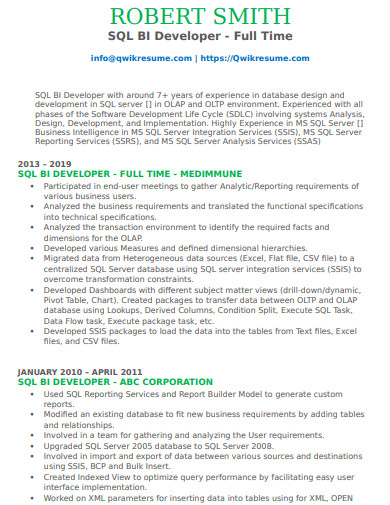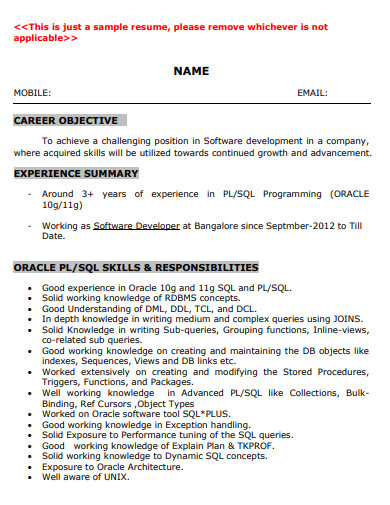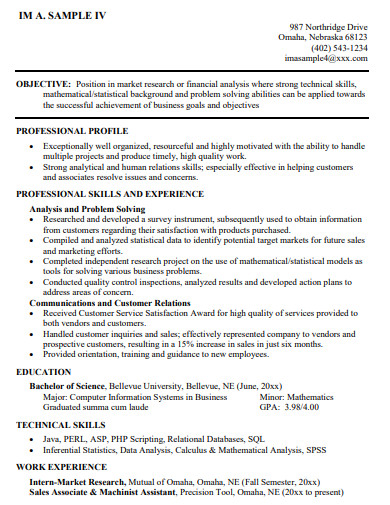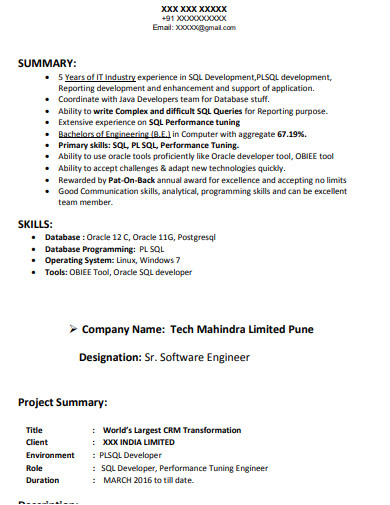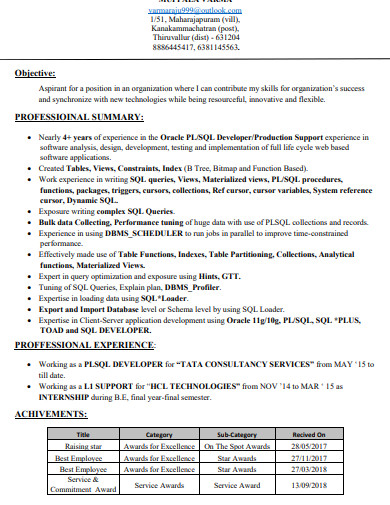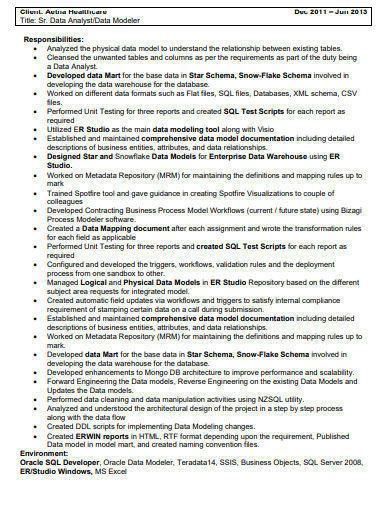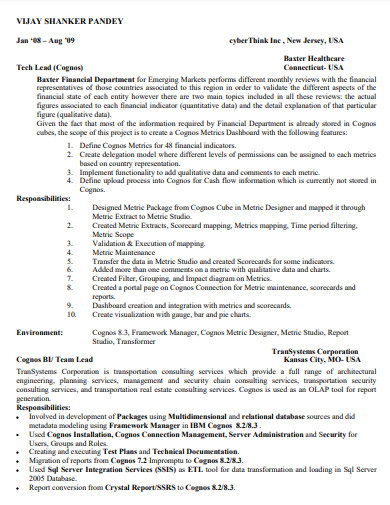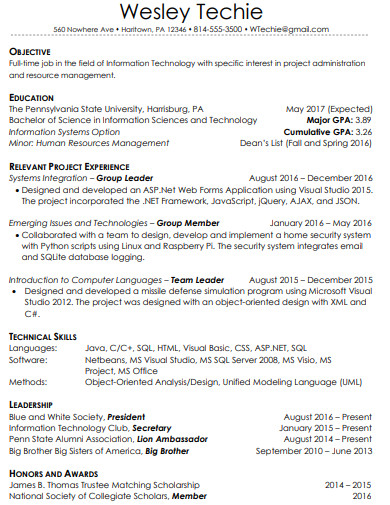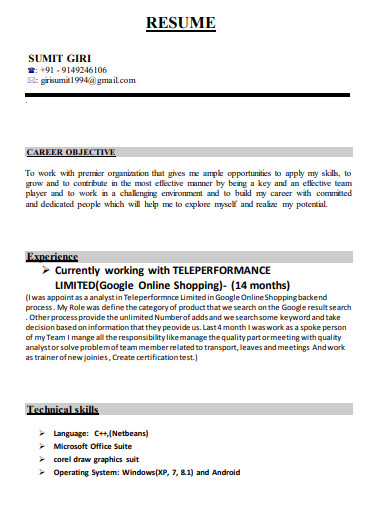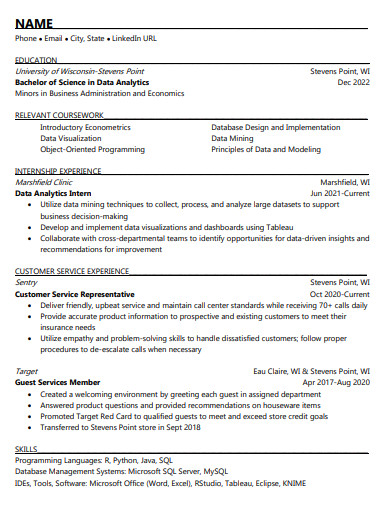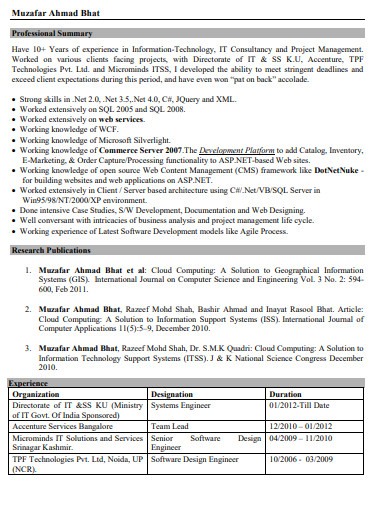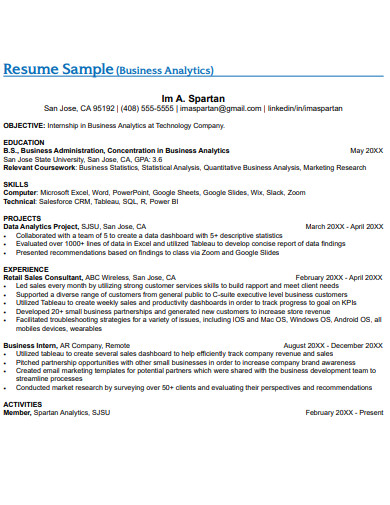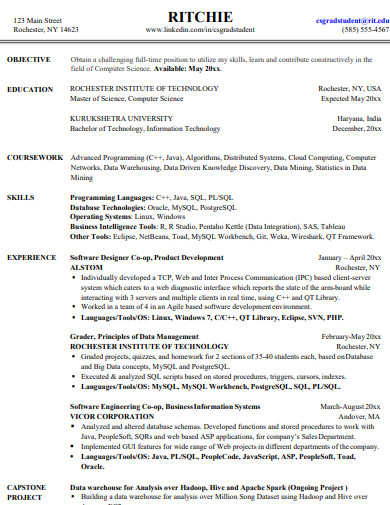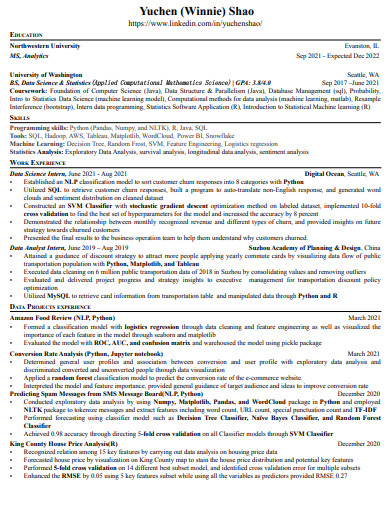14+ SQL Resume Examples to Download
Navigating the competitive field of database management requires a resume that stands out. Our guide on SQL Resume Examples offers a comprehensive walkthrough to articulate your skills and experiences effectively. Learn How to Write a tailored resume that underscores your expertise and achievements in SQL. With our insider Tips, make every word count, presenting yourself as an invaluable asset to potential employers, ready to drive innovation and efficiency in their data management processes.
What is an SQL Resume? – Definition
An SQL resume is a professional document that highlights a candidate’s expertise and experience in SQL (Structured Query Language). It outlines their abilities in writing, debugging, and optimizing SQL code, managing databases, and analyzing data. The resume is tailored to showcase the individual’s proficiency in utilizing SQL to meet the specific requirements of roles in database management, data analysis, and related fields, aiming to attract potential employers.
What is the Best Resume Example for an SQL Job?
The best resume for an SQL job effectively highlights technical expertise, practical experience, and a track record of applying SQL skills in real-world settings. Below is an illustrative example:
Contact Information
- Name: Jane Doe
- Phone: (123) 456-7890
- LinkedIn: linkedin.com/in/janedoe
Objective
Experienced SQL Developer with 5 years of experience in database management, eager to contribute deep expertise in SQL, data analysis, and optimization at XYZ Corp.
Skills
- SQL query optimization
- Database design & administration
- Data analysis and visualization
- Performance tuning
- Data security and privacy protocols
- Problem-solving and critical thinking
Work Experience
SQL Developer | ABC Tech Solutions, 2019 – Present
- Enhanced data retrieval speed by 50% through optimizing SQL queries.
- Implemented security protocols, reducing data breaches by 30%.
- Led a team in a major database upgrade, improving system performance.
Junior SQL Developer | DataWorld, 2017 – 2019
- Assisted in developing and maintaining over 50 databases.
- Collaborated in migrating data, ensuring zero data loss.
- Contributed to the automation of backup and restoration processes.
Education
Bachelor of Science in Computer Science, 2017 University of Tech – City, State
Certifications
- Microsoft Certified: Azure Data Engineer Associate
- Oracle Certified Professional, MySQL Database Administrator
Projects
Customer Data Optimization Project, ABC Tech Solutions
- Spearheaded the optimization of customer data handling, leading to a 25% improvement in data processing efficiency.
1. SQL BI Developer Resume Example
Discover key elements of an effective SQL BI Developer resume. Gain insights on showcasing your prowess in SQL and BI tools, emphasizing data analytics, reporting skills, and achievements. Learn how to make your application stand out, reflecting your ability to convert complex data into strategic business insights and drive innovation.
2. SQL 2 Year Experience Resume Example
Explore our SQL 2 Year Experience Resume Example to elevate your job application. Highlight your proven skills in database management, query optimization, and analytics, backed by real-world experience. This tailored template accentuates hands-on achievements and SQL expertise, offering a blueprint to impress recruiters in the competitive tech landscape.
3. SQL Entry Level Resume Example
Uncover a specialized SQL Entry Level Resume Example, designed to accentuate budding talents in database management and SQL proficiency. Ideal for new professionals, it highlights educational achievements, internships, and relevant project experience, providing a structured format to present emerging skills and potential in a compelling and professional manner.
4. Professional SQL Resume Example
Dive into a Professional SQL Resume Example, crafted for seasoned SQL specialists. With a focus on advanced skills, notable achievements, and years of hands-on experience, this resume template is a gateway to showcasing your refined expertise in SQL programming, database management, and data analysis to potential employers effectively.
5. Fresher SQL Resume Example
Step into the professional world with our Fresher SQL Resume Example. Tailored for newcomers, it highlights educational milestones, project experiences, and foundational SQL skills. This example helps fresh graduates effectively present their theoretical knowledge and initial exposure to SQL, setting the stage for entry into the tech industry with confidence.
6. SQL Data Analyst Resume Example
Explore the SQL Data Analyst Resume Example, a resource designed for professionals eager to display their prowess in data interpretation using SQL. It underscores expertise in data mining, analysis, and reporting, presenting a structured way to showcase skills that turn raw data into meaningful business insights and strategies.
7. Basic SQL Resume Example
Navigate the Basic SQL Resume Example, tailored for individuals showcasing foundational SQL skills. It emphasizes essential knowledge and experiences in query writing and basic database management. This template is a stepping stone for enthusiasts and early-career professionals aiming to delineate their SQL competencies effectively to prospective employers.
8. SQL Developer Resume Example
Discover the SQL Developer Resume Example, curated for professionals illustrating advanced SQL coding and database management skills. Highlight your expertise in developing efficient database systems, intricate data manipulation, and optimal performance tuning. This template aids in showcasing your accomplishments and skills to make a powerful impression on recruiters.
9. SQL Programming Resume Example
Delve into the SQL Programming Resume Example, crafted for coders eager to exhibit their expertise in SQL scripts and database optimization. This resource emphasizes technical prowess, project accomplishments, and advanced programming skills, offering a strategic layout to present your capabilities in SQL coding and application development to future employers.
10. SQL Intern Resume Example
Explore the SQL Intern Resume Example, designed for aspiring interns ready to showcase their budding SQL and database management skills. This template highlights educational backgrounds, foundational SQL knowledge, and relevant projects, offering a concise format for newcomers to present their readiness and enthusiasm for real-world SQL application and learning.
11. SQL Business Analyst Resume Example
Unravel the SQL Business Analyst Resume Example, engineered for professionals blending SQL expertise with business acumen. It accentuates skills in data analysis, business strategy formulation, and SQL query optimization. A comprehensive layout to convey your capability to transform complex data into actionable, profit-driven business strategies and solutions.
12. SQL Business Analytics Resume Example
Discover the SQL Business Analytics Resume Example, tailored for analysts illuminating their SQL mastery in business contexts. This model underscores the integration of SQL proficiency with analytics, highlighting skills in data examination, insights derivation, and strategic business decisions. Ideal for showcasing your capability to convert data into valuable business insights.
13. SQL Objective Resume Example
Explore the SQL Objective Resume Example, crafted for professionals outlining their specific goals and SQL expertise upfront. This format aids in directly aligning your SQL skills and career aspirations with potential employers’ needs, offering clarity and focus. Ideal for making an impactful first impression while outlining your professional trajectory.
14. General SQL Resume Example
Dive into the General SQL Resume Example, a versatile template suited for a range of SQL professionals. It encapsulates core SQL competencies, database management expertise, and relevant experience. This all-encompassing format is a valuable asset for SQL experts looking to present a broad spectrum of their skills and accomplishments.
15. SQL Data Analytics Resume Example
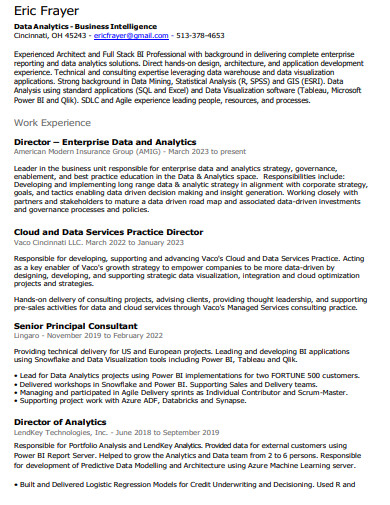
ericfrayer.com
Discover the SQL Data Analytics Resume Example, designed for data enthusiasts showcasing their SQL analytics prowess. Highlight your adeptness in transforming raw data into actionable insights using SQL. This layout accentuates skill in analytics, reporting, and decision-making, offering a window to your capability to drive informed business strategies.
Job Description Example for SQL Resume
- Position: SQL Developer
- Company: InnovateTech Solutions
- Location: San Francisco, CA
Job Description:
InnovateTech Solutions is looking for a dynamic SQL Developer to join our fast-paced team. The ideal candidate will possess in-depth knowledge of SQL database management, data analysis, and system optimization.
Key Responsibilities:
-
- Develop and Optimize SQL Queries:
Create efficient SQL queries to retrieve and analyze data from complex database systems.
-
- Database Management:
Develop, maintain, and optimize database systems, ensuring data accuracy, security, and availability.
-
- Data Analysis:
Work closely with data analysts and other stakeholders to translate data insights into actionable business strategies.
-
- System Optimization:
Enhance the performance of database systems, ensuring quick and reliable data retrieval.
-
- Security Protocols:
Implement and monitor security protocols to safeguard sensitive information.
-
- Collaboration:
Work cross-functionally with developers, analysts, and business units to develop scalable SQL solutions.
Qualifications:
- Bachelor’s degree in Computer Science, Information Technology, or a related field.
- 3+ years of experience in SQL development and database management.
- Proficient in SQL programming, data modeling, and performance tuning.
- Knowledge of SQL Server, MySQL, or other database technologies.
- Strong analytical, problem-solving, and communication skills.
- Familiarity with data privacy and security standards.
What We Offer:
- A competitive salary and comprehensive benefits package.
- Opportunities for professional development and career growth.
- A collaborative work environment with a team of talented professionals.
- Work on innovative projects with a focus on emerging technologies.
Skills on Resume Required for an SQL Job
Technical Skills:
-
- SQL Programming:
Proficiency in writing, optimizing, and debugging SQL queries and stored procedures.
-
- Database Management:
Experience in designing, administering, and optimizing databases.
-
- Data Modeling:
Skills in creating complex data models to organize and store data efficiently.
-
- Data Analysis:
Ability to analyze and interpret complex data to derive actionable insights.
-
- Data Warehousing:
Experience with data warehousing technologies and ETL processes.
-
- Performance Tuning:
Skills in optimizing database performance and query execution.
Software and Tools:
-
- SQL Server/MySQL/Oracle:
Familiarity with specific database technologies and platforms.
-
- BI Tools:
Experience with business intelligence tools like Tableau, Power BI, etc.
-
- Version Control:
Knowledge of version control systems like Git.
Soft Skills:
-
- Problem Solving:
The ability to troubleshoot and resolve database issues effectively
-
- Communication:
Skills to convey technical information to non-technical stakeholders clearly
-
- Teamwork:
Collaborating effectively with other professionals in cross-functional teams.
-
- Attention to Detail:
Ensuring data accuracy and integrity in all tasks.
Security and Compliance:
-
- Data Security:
Knowledge of protocols to safeguard data against breaches and unauthorized access.
-
- Compliance:
Understanding of legal and regulatory requirements related to data storage and privacy.
Additional Skills:
-
- Project Management:
Managing database projects from initiation to completion.
-
- Adaptability:
Adapting to new tools, technologies, and methodologies quickly.
Customization is Key:
Always tailor the skills section of your resume to match the specific requirements of the job description. Highlighting your expertise in areas that align with the employer’s needs can significantly increase your chances of getting noticed.
SQL Resume Objectives Examples
Certainly! Crafting a strong objective for an SQL resume sets the tone and showcases your primary goals and qualifications. Here are some objective examples tailored for various SQL roles:
-
- Entry-Level SQL Developer:
“Motivated Computer Science graduate with a strong foundation in database management. Eager to apply my SQL skills and knowledge in a real-world setting to enhance database efficiency and contribute to XYZ Company’s data-driven goals.”
-
- Experienced SQL Developer:
“SQL Developer with 5+ years of expertise in optimizing database systems, seeking a challenging role at ABC Corp. Aiming to leverage proven skills in SQL programming and data analysis to drive efficiency and innovation.”
-
- SQL Data Analyst:
“Detail-oriented Data Analyst with a strong background in SQL and a track record of transforming raw data into actionable insights. Seeking to utilize my analytical expertise and passion for problem-solving at DataTech Enterprises.”
-
- SQL Database Administrator:
“Experienced SQL Database Administrator aiming to leverage extensive skills in database optimization, security, and backup procedures to ensure high availability and performance at TechSolutions Inc.”
-
- Transitioning to SQL Role:
“Professional with a decade in financial analysis, aiming to transition into a SQL-focused role. Bringing strong analytical skills, combined with recent SQL certification, to contribute to and grow within QRS Technologies.”
-
- SQL Consultant:
“Seasoned SQL Consultant with 7 years of experience helping organizations streamline their database systems. Seeking a role at Innovative Tech where I can provide strategic SQL solutions and guidance.”
-
- Team Lead Objective:
“Lead SQL Developer with a knack for mentoring and a history of improving database performance by 40%. Looking to leverage leadership skills and technical expertise at GlobalTech’s dynamic environment.”
Always ensure that your objective is tailored to the specific role you’re applying for, highlighting the unique blend of skills and experiences you bring to the table.
How do I write my SQL skills on a resume?
1. Identify Relevant SQL Skills:
-
- a. Job Description Analysis:
Analyze the job description meticulously to identify the specific SQL skills the employer is looking for. Match these requirements with your own skills.
-
- b. Skill Inventory:
List all your SQL skills, including writing and optimizing queries, database administration, data analysis, and more.
2. Skill Classification:
-
- a. Technical Skills:
Classify your technical skills, focusing on specific SQL competencies, database platforms, and tools you are proficient in.
-
- b. Soft Skills:
Identify soft skills that complement your technical SQL abilities, such as problem-solving, teamwork, and communication.
3. Resume Sections for SQL Skills:
-
- a. Objective or Summary:
Integrate SQL skills into your objective or summary, indicating your proficiency and how it aligns with the company’s goals.
-
- b. Skills Section:
Create a dedicated skills section where you list your SQL skills, using keywords from the job description to enhance visibility.
-
- c. Work Experience:
Incorporate SQL skills in your work experience, using action verbs and quantifying achievements where possible.
4. Quantifying Achievements:
-
- a. Metrics:
Use metrics to quantify your achievements, showing the impact of your SQL skills in previous roles.
-
- b. Project Outcomes:
Highlight specific projects where your SQL skills led to positive outcomes, using numbers to provide context.
5. Tailoring SQL Skills to Job Roles:
-
- a. Customization:
Tailor the presentation of your SQL skills to fit the unique requirements of each job role.
-
- b. Relevance:
Prioritize the most relevant skills that align closely with the job description.
6. Incorporating Keywords:
-
- a. ATS Optimization:
Use keywords related to SQL skills from the job description to optimize your resume for Applicant Tracking Systems (ATS).
-
- b. Variations:
Include variations of keywords to cover different terminologies used by different employers.
7. Proofreading and Formatting:
-
- a. Clarity:
Ensure each skill is presented clearly, avoiding jargon unless it’s industry-standard.
-
- b. Professional Layout:
Adopt a clean, professional layout to enhance the readability of your SQL skills.
8. Continuous Learning:
-
- a. Certifications:
If applicable, include certifications to validate your SQL skills and indicate your commitment to continuous learning.
-
- b. Workshops and Seminars:
Mention any additional training or workshops attended that enhance your SQL expertise.
What is an SQL related experience resume?
Understanding its Components:
-
- 1. Objective Statement:
A concise introduction that aligns your SQL expertise with the employer’s needs.
Should be tailored to reflect the specific SQL skills and experiences required for the job.
-
- 2. SQL Skills Section:
A dedicated segment listing your SQL and related technical skills.
Includes database querying, optimization, management, and data analysis skills.
-
- 3. Work Experience:
Highlighting your professional background in roles that required the use of SQL.
Focus on achievements and responsibilities related to SQL tasks and projects.
-
- 4. SQL Projects:
Detailing projects where SQL was pivotal; can include academic, freelance, or personal projects.
Demonstrates your hands-on experience and problem-solving capabilities.
-
- 5. Education and Certifications:
Listing academic qualifications and certifications that are related to SQL.
Indicates your formal training and knowledge validation.
Crafting the SQL Related Experience Resume:
-
- 1. Analyze the Job Description:
Identify the specific SQL and related skills the employer is seeking.
Tailor your resume to meet these specific requirements.
-
- 2. Quantify Achievements:
Use metrics to give a clear picture of your contributions and impacts in previous roles.
Makes your achievements measurable and tangible.
- 3. Use Action Words:
Start bullets with action verbs to make your contributions dynamic and impactful.
Enhances readability and engagement.
- 4. Highlight Problem-Solving:
Include instances where you used SQL to solve complex problems or enhance processes.
Demonstrates your analytical and practical skills.
Optimizing for ATS:
-
- 1. Keywords:
Integrate keywords from the job description to make your resume ATS-friendly.
Enhances the chances of your resume being seen by a recruiter.
-
- 2. Simple Formatting:
Use a clean and straightforward format to ensure ATS readability.
Avoid complex designs or elements that could confuse the ATS.
Continuous Improvement:
-
- 1. Update Regularly:
Keep adding new skills, experiences, and achievements as your career progresses.
Ensures your resume remains current and competitive.
- 2. Seek Feedback:
- Have mentors or peers review your resume for improvements.
Provides fresh perspectives and improvement suggestions.
How do you show you know SQL on resume?
Identify Key SQL Skills
-
- 1. Understand the Job Description:
Analyze the job requirements to identify the specific SQL skills employers are looking for.
Align your SQL skillset with the job specifications.
-
- 2. List Your SQL Competencies:
Inventory your SQL abilities, including writing queries, database management, data analysis, and other related technical skills.
Incorporate SQL Skills in Different Sections
-
- 1. Objective or Summary Section:
Craft a targeted objective that incorporates your SQL expertise relevant to the job role.
-
- 2. Skills Section:
Create a distinct section to list your SQL skills, making it easily identifiable and readable.
-
- 3. Work Experience Section:
Highlight roles where you utilized SQL, emphasizing accomplishments and contributions linked to these skills.
Use Quantifiable Achievements
-
- 1. Metrics and Data:
Use quantifiable data to showcase the impact of your SQL skills, like optimizing processes, improving data retrieval times, or enhancing system performance.
-
- 2. Project Outcomes:
Reference specific projects that illustrate your SQL proficiency, focusing on successful outcomes and achieved goals.
Highlight Education and Certifications
-
- 1. Relevant Courses:
Mention coursework or degrees that included substantial SQL content or were focused on related areas.
-
- 2. Certifications:
List SQL certifications to provide concrete evidence of your skills and knowledge.
Include Real-World Applications
-
- 1. Problem Solving:
Showcase scenarios where you employed SQL to solve complex problems or make significant improvements.
-
- 2. SQL Technologies:
Mention your experience with SQL servers, tools, and technologies to give a practical context to your skills.
Optimizing for ATS Systems
-
- 1. Keywords Integration:
Incorporate SQL-related keywords from the job description to optimize your resume for ATS systems.
-
- 2. Formatting:
Adopt a clean, ATS-friendly format to ensure your SQL skills are easily identifiable and readable by the system.
Continuous Skill Enhancement
-
- 1. Professional Development:
Highlight your ongoing learning initiatives, workshops, or seminars attended to keep your SQL skills updated.
-
- 2. Community Participation:
Mention contributions to online forums, communities, or open-source projects related to SQL to demonstrate your practical engagement with the skill.
Tips for Writing an SQL Resume
-
- 1. Customize to the Job Description:
Tailor your resume to fit the specific job description. Highlight your skills and experiences that align with the employer’s needs.
-
- 2. Include Specific SQL Skills:
Mention specific SQL skills, including writing and optimizing queries, database administration, data modeling, and more.
-
- 3. Quantify Achievements:
Use numbers to quantify your achievements, e.g., “Improved database performance by 30% through optimizing SQL queries.”
-
- 4. Highlight Relevant Experience:
Focus on relevant experiences that demonstrate your SQL skills and accomplishments.
-
- 5. Add a Technical Skills Section:
Create a distinct section for technical skills to quickly showcase your expertise.
-
- 6. Showcase Certifications:
Include relevant certifications to validate your skills and knowledge in SQL and database management.
-
- 7. Optimize the Objective Statement:
Write a concise, targeted objective statement that reflects your career goals and how you align with the company’s objectives.
-
- 8. Mention Relevant Projects:
Add projects that highlight your hands-on experience and achievements in SQL.
-
- 9. Use Action Verbs:
Start bullet points with action verbs like “developed,” “optimized,” or “implemented” to make your contributions more impactful.
-
- 10. Proofread:
Ensure your resume is free from errors. Consider using online tools or seeking professional help for proofreading.
-
- 11. Focus on Layout and Format:
Adopt a clean, professional layout. Use bullet points, headings, and white space for readability.
-
- 12. Include Soft Skills:
Mention soft skills like problem-solving, teamwork, and communication to show you can thrive in a collaborative environment.
-
- 13. Update Regularly:
Keep your resume updated with recent achievements, skills, and experiences.
-
- 14. Address ATS Systems:
Use keywords from the job description to optimize your resume for Applicant Tracking Systems.
-
- 15. Add Professional Development Endeavours:
Include any workshops, courses, or seminars attended that contribute to your professional development as an SQL expert.
Conclusion:
Creating an effective SQL resume involves showcasing a blend of your technical prowess, achievements, and soft skills, tailored to meet the specific needs of the job you’re applying for. Paying meticulous attention to details, aligning with the job requirements, and presenting your information professionally can set you apart in the competitive field of SQL and database management.
Crafting a compelling SQL resume involves highlighting specific skills, real-world applications, and quantifiable achievements. Tailor your resume to each job description, optimize for ATS, and underscore continuous skill enhancement. This strategic approach ensures your SQL expertise is vividly demonstrated, positioning you as an ideal candidate in the competitive database management and data analysis job market.



